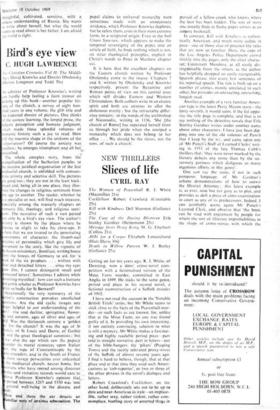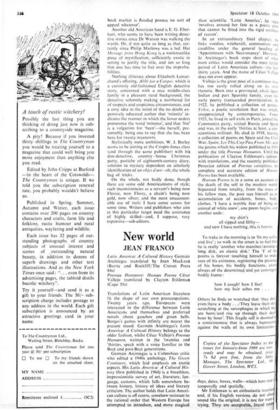NEW THRILLERS
Slices of life
CYRIL RAY
The Women of Peasenhall R. J. White (Macmillan 21s) Cockleburr Robert Crawford (Constable 25s) Kill with Kindness Dell Shannon (Gollancz 25s) The Case of the Daring Divorcee Erle Stanley Gardner (Heinemann 25s) Message front Hong Kong M. G. Eberhart (Collins 21s) Alibi for a Corpse Elizabeth Lemarchand (Hart-Davis 30s) Death in Willow Pattern W. J. Burley (Gollancz 25s)
Getting on for ten years ago, R. J. White, of Downing. won a dons' crime-novel com- petition with a fictionalised version of the Moat Farm murder, committed in East Anglia in 1899. He sticks to the same genre, period and place in his second novel, a fictional reconstruction of a Suffolk murder of 1902.
I have not read the account in the 'Notable British Trials' series, but Mr White seems to stick close to the facts of the Peasenhall mur- der—or such facts as are known, for, unlike that at the Moat Farm. no one was found guilty of it. In providing his own interesting, if not entirely convincing, solution to what is still a mystery, Mr White makes a fascinat- ing and highly readable period piece—part told in straight narrative, part in letters—out of the bible-bangers, the 'pikers' (Peeping Toms) and the tacitly tolerated proxy-wives of the Suffolk of almost seventy years ago. I find it hard to believe, though, that at that place and at that time they used such Ameri- canisms as 'cub-reporter', or two or three of the other phrases in the novel's dialogue and letters.
Robert Crawford's Cockleburr, on the other hand, deliberately sets out to be up to date and near-American in style—an implaus- ible, rather sexy, rather violent, rather com- monplace, bustling story of assorted thugs in
pursuit of a fellow-crook who knows where the loot has been hidden. The sort of story one usually finds in flashy paper covers at an airport bookstall.
In contrast, Kill with Kindness is authen- tically American, and much more sedate in pace—one of those slice-of-precinct-life tales that are now so familiar. Here, the cops of the Los Angeles Police Department crowd thickly into the pages. only the chief charac- ter: Lieutenant Mendoza. at all easily dis- tinguishable from the others, as the author has helpfully dropped an easily recognisable Spanish phrase into every few sentences of his reported speech. The tale is built up on a number of crimes, mostly unrelated to each other, but provides an unexacting, unexciting, longish read.
Another example of a very familiar Ameri- can type is the latest Perry Mason story—the forty-seventh, it would seem, if the list oppo- site the title page is complete, and that is to say nothing of the detective novels that Erle Stanley Gardner writes under another name about other characters. I have just been dip- ping into one of the old volumes of Punch that I keep by the we, and came upon one of `Mr Punch's Staff of Learned Clerks' writ- ing in 1933 of the late Thomas Cobb's thrillers that. 'they were never marked by the literary defects any more than by the un- savoury goriness which disfigures so many ingenious efforts in this genre'.
One can say the same, if not in such pompous language, of Mr Gardner's urbane demonstrations of how to outwit the District Attorney : this latest example is, as ever, neat but not gory as to plot, and provides as deft a piece of cross-examination in court as any of its predecessors. Indeed, I can justifiably quote again Mr Punch's Learned Clerk, and observe that 'the book can be read with enjoyment by people for whom the sort of illiterate improbabilities in the shape of crime-stories with which the book market is flooded possess no sort of appeal whatever'.
Another old American hand is E. G. Eber- hart, who seems to have been writing detec- tive stories since Dr Watson was walking the wards. Or, if not quite so long as that, cer- tainly since Philip Marlowe was a lad. Her Message from Hong Kong is a workmanlike piece of mystification, sufficiently exotic in setting to justify the title, and not so long that one has time to fret over the improba- bilities.
Nothing illiterate about Elizabeth Lemar- chand's offering, Alibi for a Corpse, which is a curiously old-fashioned English detective story, concerned with a nice middle-class family in a pleasant rural background, the detective solemnly making a numbered list of suspects and suspicious circumstances, and a cosy idea in the mind of the no doubt ex- pensively educated author that `minnits' in- dicates the manner in which the lower orders pronounce the word 'minutes', and that 'bin' is a vulgarism for `been'—she herself, pre- sumably, being one to say that she has bean here for twenty myenewts.
Stylistically more ambitious, W. J. Burley seems to be airhing at the Crispin-Innes class (and through the same publisher) with his don-detective, country - house Christmas party, pastiche of eighteenth-century diary, solution to mystery dependent on scholarly identification of an objet d'art—oh, the whole bag of tricks.
On the whole, not badly done, though there are some odd Americanisms of style; such inconsistencies as a servant's being now Flossie, now Flossy, a chain's being now gold, now silver; and the most unaccount- able use of italic I have come across for some time. Writers and publishers who aim at this particular target need the assistance of highly skilled—and, I suppose, very expensive—sub-editors.



































 Previous page
Previous page